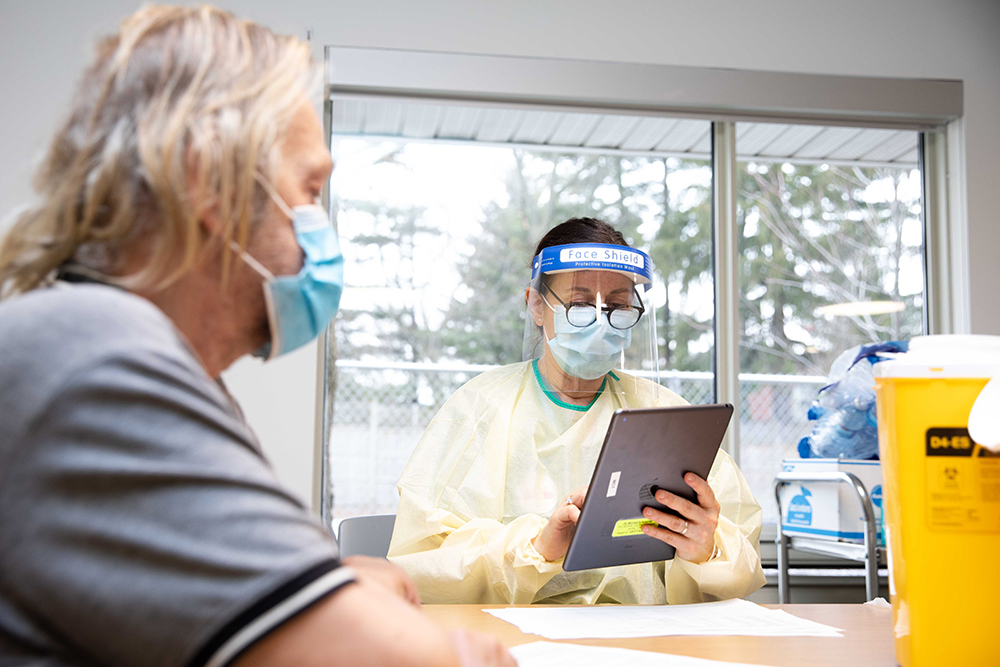
January 18, 2021
By Danielle Pereira
Clients of a small number of Toronto-area shelters will receive the COVID-19 vaccine as part of a new pilot project that will produce a playbook to help guide the eventual province-wide effort to protect people experiencing homelessness.
Priority will go to sites with the highest population of seniors, given their significant risk of severe outcomes as a result of COVID-19. Unity Health is working in partnership with Ontario Health, Inner City Health Associates, Toronto Public Health, the City of Toronto’s Shelter, Support & Housing Administration (SSHA) and other partners.
“Unity Health Toronto has been asked to develop a playbook for COVID-19 vaccination in shelters for vulnerable populations,” said Dr. Tim Rutledge, Unity Health President and CEO. “This will help guide system partners who will be providing vaccinations in congregate settings for people at risk. We are honoured to contribute to this work that is at the core of our mission and values at Unity Health.”
The COVID-19 pandemic has been particularly hard on people experiencing homelessness, with shelters having to cut back the number of beds they offer to facilitate physical distancing, as well as the challenges of outbreaks on staff and clients. Many people experiencing homelessness have also stopped using shelters due to a fear of contracting COVID-19.
The city-operated Scarborough Village Residence was the first pilot site where more than 80 individuals, including more than 50 senior residents, were vaccinated using the COVID-19 Pfizer-BioNTech vaccine.
Kevin Enman, a staff member at Scarborough Village Residence who received his vaccine as part of the pilot, said he wanted to get the vaccine to protect himself and his loved ones.
“My wife has underlying health issues and I serve the homeless population in my job, and also my daughter and son-in-law work in a nursing home. We’ve all been affected by COVID so there’s hope with getting the vaccine today.”
Dr. Karen Weyman, Chief of the St. Michael’s Hospital Department of Family and Community Medicine, said teamwork is crucial to the success of the vaccination efforts.
“I believe that collaboration is key to the success of an initiative like this one. We’re all working together and that has made a huge difference in being able to immunize all of the eligible residents and some of the shelter staff today,” Dr. Weyman said. “When we arrived the shelter team had done a lot of the work to get the residents and staff prepared for their COVID-19 vaccine. Working as a team led to the success of the day.”
The pilot, which will conclude in a few weeks, will vaccinate hundreds of shelter staff and clients, and produce a playbook for vaccination in all shelters that will be shared with other organizations and partners in the community.
The pilot will allow for learnings in administration and logistics, such as the transportation of the Pfizer-BioNTech vaccine, which was transported from St. Michael’s Hospital to be administered at the Scarborough Village site. These lessons learned will help system partners as Ontario’s vaccine roll out expands to shelter and congregate living settings.
Unity Health, Inner City Health Associates, Ontario Health, Toronto Public Health and SSHA are continuing to collaborate on identifying pilot sites and engaging with those shelter partners to plan for administering vaccinations at their sites.
“Providing vaccines to this population is tremendously rewarding, particularly since our teams have witnessed the significant impact of COVID-19 on the homeless and shelter population,” says Linda Jackson, Senior Clinical Director of Primary Care at St. Michael’s. “We look forward to engaging with partners to ensure all residents of shelters and other congregate settings receive a vaccination as soon as possible.”
